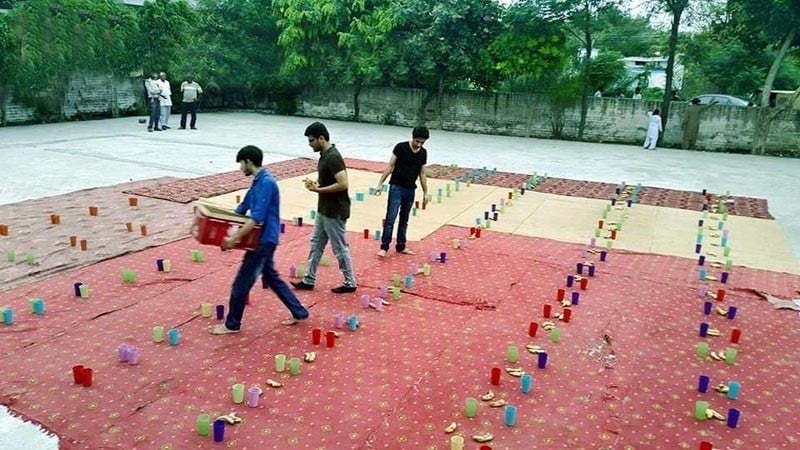
Started by three LUMS sophomores, Rizq makes use of surplus food by collecting it from households and events such as weddings and parties and distributes it to those in need

Ever considered the disparity between the amount of food that is wasted in restaurants, dhabas and even at our wedding ceremonies, and the amount of poor people who go to bed hungry? Well, Rizq did, and famously so.
A mini campaign, started by three Lahore University of Management Sciences (LUMS) sophomores -- Huzaifa Ahmed, Musa Aamir and Qasim Javaid -- almost a year ago, Rizq aims to make use of surplus food by collecting it from households and events such as weddings and parties and distributing it to those in need.
Talking to TNS, Co-founder Huzaifa Ahmed explains that Rizq was created as an awareness campaign to not only combat food wastage but also to promote healthy dietary habits in deprived areas of Lahore.
When asked about the motivation behind such an initiative, Qasim Javaid says, "We saw the need in the community. There is a clear disparity between the amount of food that is wasted and the number of people who go to bed hungry because they don’t have anything to eat.
"We wanted to create a proper distribution channel to balance this out," he adds.
The beauty of Rizq, whose slogan is ‘Share Food, Feed Happiness,’ is that its work is actually quite simple. In the first place, such areas in the city are identified that contain a high number of food-insecure households. These areas tend to be slums and villages. Next, food drives are advertised on Rizq’s official Facebook page and website in order to encourage people to contact them if they have any extra or leftover food items from parties or otherwise to donate.
Rizq, instead of preparing fresh food, focuses on bringing to a healthy use the surplus food. To quote Musa Aamir, "Imagine if the food, instead of being wasted, is handed over to those who really need it, how many resources would be saved that were previously going to be used to prepare fresh food!"
Over the past six months, Rizq has managed to gather at least 35-40 volunteers, all students from different universities, to help carry out their projects which include iftar drives and food distribution campaigns in various locations. To date, Rizq has catered to an estimated 2,500-3,000 people.
All told, the response from people to donate surplus food or their time to Rizq has been overwhelming. Not only have the families contacted the campaign members but also major businesses and NGOs such as Kashmir Oil and Youth Connotation have expressed a desire to collaborate with Rizq. ""The amount of support we’ve been receiving is our biggest motivation," says Ahmed.
Food wastage by restaurants and households is a serious problem, even more so if you consider the fact that there is a significantly large amount of people in the country that is in genuine need of food. Considering this and the simplicity and success of the Rizq programmes, it begs the question why have other people not attempted to start similar initiatives? Lack of interest certainly doesn’t seem to be a factor if you take into account the positive feedback the Rizq has received so far. Ahmed suggests that "maybe people don’t know how to execute such an idea."
According to Musa Aamir, "It’s not because we don’t care. Perhaps, it is because we care too much and in caring too much we try to come up with grand, complex ideas with which we can help people but we end up overlooking the simple ideas."
Javaid offers an alternative viewpoint, suggesting that the people deem the food wastage issue as rather minute, without understanding the magnitude of the problem.
The founders have big plans for the future of Rizq. They have already come up with exciting and innovative methods to increase the outreach and impact of the programme. Some of these ideas include collaborating with restaurants, marriage and banquet halls, creating a Rizq food truck and Rizq mobile app, hiring paid volunteers to incentivise them and conducting food drives, at a larger scale and more regularly.
However, they also acknowledge that as students, they face a plethora of constraints in terms of their expansion plans. As Ahmed puts it, "One major issue is the time constraint." Aamir adds to it, "With academics and extra-curricular activities, it becomes really hard for the workers to remain focused."
Other issues remain the lack of manpower, finances and storage facilities. However, they are not giving up anytime soon as they intend to continue with the project after they graduate, even pointing out that the Rizq mission is designed in such a way that the volunteers can carry it out independently as well.
The founders actually believe it will be easier to sustain the campaign after graduation, as they will be able to give it their full attention and register it as an organisation so they can keep developing the campaign. By then, they hope the support for the campaign shall have increased.
In the final analysis, Rizq is the perfect example of a small initiative with a huge impact. It has the potential to grow into a something that can help combat the issue of food wastage in Lahore and eventually, in Pakistan as a whole.